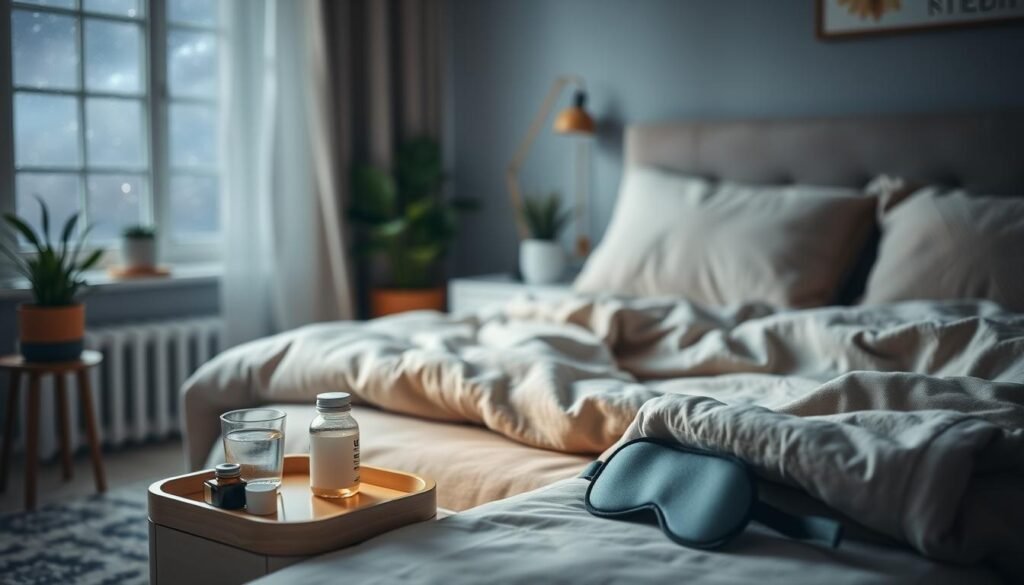About two-thirds of people with ADHD struggle to sleep well. This big number shows a link between ADHD and sleep problems. Especially for those taking stimulants like Focalin (dexmethylphenidate). Though it helps with ADHD, Focalin can cause serious sleep issues. This is called focalin insomnia. People with this problem find it hard to fall asleep, stay asleep, and get refreshing sleep. This can make their ADHD symptoms worse during the day. Knowing about focalin insomnia is key to handling and treating it well, leading to a better quality of life.
Research shows around 30 percent of ADHD kids have nightly insomnia with stimulants. This is in contrast to just 10 percent who don’t take these medicines. The connection between Focalin and sleep troubles highlights the importance of being aware of ADHD medication side effects.
Key Takeaways
- Focalin can lead to focalin insomnia, affecting sleep quality in ADHD patients.
- Approximately 30% of children on stimulants experience insomnia compared to 10% of those not on medication.
- Effective management of sleep issues is crucial for individuals with ADHD.
- Understanding the side effects of Focalin is key to improving sleep quality.
- Conducting research and informing healthcare providers helps address these sleep disturbances effectively.
Understanding Focalin and Its Impact on Sleep
Focalin is a stimulant medication often given for ADHD. It boosts dopamine in the brain to improve focus. But, it can affect sleep quality. Higher doses are linked to problems falling asleep and shorter sleep time.
Studies show that people taking 30 mg of Focalin sleep less than those on a placebo. Starting to sleep gets especially hard with doses of 20 or 30 mg. It’s important to watch the dose closely during treatment.
Children with ADHD can suffer if their sleep is cut short. Losing just an hour of sleep can harm their behavior and brain function. Shockingly, 17-32% of kids on such medicines might face severe insomnia. This points out an important part of managing ADHD.
Knowing how Focalin affects sleep helps doctors treat ADHD better. Being aware of sleep issues allows for smarter choice of dose and medication. This way, patients get the right ADHD care while keeping good sleep quality.
What is Focalin and How Does It Work?
Focalin, also known as dexmethylphenidate, is a well-known ADHD medication. It helps improve focus and concentration in people with Attention Deficit Hyperactivity Disorder. It is a special form of methylphenidate that works on the brain’s neurotransmitters.
It increases dopamine and norepinephrine by stopping their reuptake. This leads to better attention spans and less impulsivity in users.
Focalin is prescribed for both kids and adults with ADHD. Many benefit from it, but there can be side effects like insomnia. Still, serious side effects are rare, showing Focalin’s safety and effectiveness.
Doctors stress the importance of watching for adverse reactions. Dexmethylphenidate can affect blood pressure and heart rate. Though major issues are uncommon, being informed is crucial for users of Focalin.
Focalin Insomnia: Exploring the Connection
Focalin and sleep problems are closely linked, especially in people with ADHD. Almost two-thirds of those with ADHD face sleep issues. Things like being overly active and not following a sleep schedule make it worse. This leads to more insomnia cases than in other people.
Prevalence of Sleep Issues Among ADHD Patients
ADHD often brings sleep problems, causing frequent insomnia and related disorders. About 67% of children with ADHD have trouble sleeping. This creates a cycle where ADHD and sleep troubles mix with Focalin’s effects. Addressing both ADHD and its treatment is vital for improving health.
Mechanisms of Stimulant-Induced Insomnia
Focalin’s stimulating effects can mess with sleep. It can make falling asleep hard and delay sleep. This kind of insomnia disturbs the body’s internal clock and impacts melatonin. Kids on ADHD meds, like Focalin, are more likely to have sleep issues. It’s important to deal with these side effects to improve sleep.
Focalin helps with focus but can cause moodiness and anxiety. Managing its side effects is key. If you’re dealing with insomnia from Focalin, talk to a health expert for help. For more on Focalin’s emotional side effects, read more here.
| Adverse Reaction | Prevalence Rate (%) |
|---|---|
| Loss of Appetite | 36 |
| Sleep Problems | 26 |
| Mood-Related Reactions | 21 |
| Nausea and Gastrointestinal Pain | 11 |
| Headache | 10 |
Symptoms of Focalin Induced Sleep Disturbances
It’s important to recognize when Focalin causes sleep problems. People on this medication may struggle to sleep, wake up often, or feel like they haven’t slept well. Spotting these signs early helps in getting the right help and improving life quality.
Common Signs of Insomnia
Key symptoms of insomnia include:
- Difficulty sleeping at night, which disrupts daily life.
- Feeling tired during the day, impacting your focus and work.
- Getting easily upset or moody because you’re not sleeping well.
- Waking up several times at night, which breaks your sleep.
Other Sleep-Related Symptoms in ADHD
ADHD can cause other sleep issues beyond insomnia. Some of these are:
- Restless legs syndrome (RLS), making your legs feel weird and needing to move them.
- Sleep apnea, leading to pauses in breathing that make you very tired.
- Feeling hyper or impulsive when medication fades, which affects sleep.
Recognizing these symptoms is a big step towards managing sleep problems. Tackling insomnia and other sleep issues can really improve life for someone with ADHD.
Strategies for Coping with Focalin Insomnia
Individuals taking Focalin often struggle with sleep. Implementing effective strategies can greatly improve their sleep quality. Establishing healthy sleep routines and a calming bedtime procedure helps the mind and body rest well.
Establishing Healthy Sleep Hygiene
It’s vital for those with sleep issues to maintain good sleep hygiene. Strategies include:
- Keeping a consistent sleep schedule by going to bed and waking up at the same time daily
- Avoiding caffeine and stimulating activities close to bedtime
- Limiting screen time in the evening to reduce blue light exposure
- Creating a calming environment that fosters relaxation
- Incorporating regular physical activity, aiming for at least 150 minutes each week, to reduce anxiety and hyperactivity
Creating a Calming Bedtime Routine
To enhance sleep quality, a calming bedtime routine is key. Relaxation techniques to consider may include:
- Reading a book or engaging in a quiet activity
- Practicing meditation or mindfulness exercises
- Incorporating deep-breathing or progressive muscle relaxation to ease tension
- Using melatonin supplements, if recommended by a healthcare provider, to normalize sleep patterns
- Ensuring a screen-free hour before bed to minimize stimulation
By following these strategies, those dealing with Focalin-related insomnia can enjoy a more peaceful sleep.
Medication Management and Sleep Quality
Managing medication well is key for tackling sleep issues caused by Focalin. Those with ADHD often have trouble sleeping. This is due to many things, including how ADHD drugs work. With 25–50% of ADHD individuals having sleep troubles, checking how ADHD medication impacts sleep is vital.
Doctors should always watch how well someone sleeps and make treatment changes as needed. They might change drug amounts, try new meds, or use non-stimulant drugs. Making these adjustments can control ADHD symptoms while keeping sleep health intact.
Studies show drugs like methylphenidate could mess up sleep at first. However, with the right medication management, sleep quality can get much better for those with ADHD. To learn more about how methylphenidate can help sleep, click on this link.

For better sleep, following good sleep habits is crucial for anyone on ADHD meds. Sticking to a regular bedtime and avoiding stimulants before sleep can greatly help. Thus, managing medication well is fundamental for good sleep in those with ADHD.
Natural Remedies to Enhance Sleep Quality
Finding ways to sleep better is key for those affected by sleep issues. Natural aids can make sleep better and help you rest well at night. Melatonin stands out for helping people fall asleep faster.
Melatonin as an Aid for Sleep Onset
Melatonin supplements are known for making it easier to fall asleep. Studies show taking 0.1 to 0.3 milligrams can help most people. The fast-release type works faster than slow-release, offering quick relief.
Relaxation Techniques for Better Sleep
Adding relaxation methods to your nighttime routine can lower stress. Mindfulness, yoga, and guided imagery create a calm setting for easier sleep. They ready your mind and body for rest, improving sleep quality.
Other natural remedies also help with better sleep. Valerian root might improve sleep but could cause headaches. Chamomile tea is famous for its calmness, but evidence on its effect on insomnia is mixed. Lavender aroma enhances deep sleep, leading to a more peaceful night.
| Natural Sleep Aid | Benefits | Considerations |
|---|---|---|
| Melatonin | Decreases time to fall asleep | Best taken 30 minutes before bed |
| Valerian | May improve sleep duration | Possible headaches or hangover effect |
| Chamomile | Calming effect | Mixed evidence for insomnia treatment |
| Lavender | Improves deep sleep quality | Considered safe with pleasant scent |
| CBD Oil | Reduces anxiety, aids sleep | Needs further research for safety |
Consulting Your Doctor: When to Seek Help
If you’re on Focalin and can’t sleep well, see a doctor. Not sleeping well can really mess up your day, mood, and health. Getting help early is key to fixing any sleep problems or medication side effects.
A doctor will look into why you can’t sleep. They’ll talk about your ADHD treatment and any medicine changes. This helps them figure out how to improve your sleep.
For insomnia, doctors might suggest sleep studies. These show how you sleep and if your treatment works.
Sometimes, your ADHD treatment needs to change if you can’t sleep. Medicines like clonidine and guanfacine might be options. They can ease ADHD and help you sleep better.
Talking honestly with your doctor is important to handle ADHD and sleep troubles. Together, you can find ways to stay sharp and sleep well.

| Sleep Disturbance | Potential Solutions |
|---|---|
| Persistent Insomnia | Consult a doctor for evaluation and treatment options. |
| Side Effects of Medications | Discuss adjustments to ADHD treatment with a healthcare provider. |
| Underlying Sleep Issues | Consider undergoing sleep studies for detailed assessment. |
| Inadequate Sleep Quality | Implement sleep hygiene practices as recommended by professionals. |
| Alternative Treatment Options | Explore non-stimulant medications for ADHD symptoms. |
The Role of Comorbid Conditions in Sleep Disturbances
Having ADHD can make sleep tricky, especially when other conditions like anxiety or depression are also present. Nearly half the people with ADHD struggle with sleep issues. This can lead to insomnia and trouble following a normal sleep pattern.
Before starting ADHD medications, only a few people report sleep problems. But with medication, sleep issues can get worse. For example, sleep problems can jump from 8% to 25% with certain ADHD meds. This shows how ADHD and sleep problems are connected.
Some kids develop sleep problems only after starting the highest doses of medication. Yet, some kids who already had sleep problems see improvement with the right approach to treatment.
Sleep issues like delayed sleep-wake phase disorder and sleep-disordered breathing are common in those with ADHD. Even restless legs syndrome affects many. Such conditions make sleep even harder, affecting life and worsening ADHD symptoms.
| Stats/Condition | Percentage |
|---|---|
| Children with parent-rated sleep problems before medication | 10% |
| Parent-rated sleep problems at high MPH dose | 25% |
| Children without pre-existing problems developing issues | 23% |
| Children with pre-existing problems still having issues at high MPH dose | 37.5% |
| Individuals with ADHD experiencing sleep problems | 25% to 50% |
| Adults with ADHD experiencing sleep deprivation-like symptoms | Varies |
Understanding how ADHD and other conditions interact is key to treating sleep issues. By addressing these challenges, we can help improve both sleep and life quality.
Long-Term Effects of Sleep Deprivation on ADHD
Not getting enough sleep can make ADHD symptoms worse. People may notice they can’t focus as well, feel more active than usual, or struggle with their emotions. These problems can make daily life tougher and managing ADHD more complicated.
Lack of sleep badly affects thinking processes. It can lead to worse memory, trouble solving problems, and a drop in overall brain function. This can make ADHD symptoms harder to handle. Often, people might start relying more on medicine, which doesn’t always help with sleep.
A lot of people with ADHD have trouble sleeping. Between 25-50% of them face sleep disorders. Almost half might need medicine to help them sleep. It’s important to focus on sleep problems when looking after ADHD. This includes adding good sleep routines to help improve brain function and quality of life.
To better understand these connections, refer to the following table that illustrates the overlaps between sleep-related issues and ADHD:
| Sleep Disorder | Prevalence in ADHD Population | Impact on Cognitive Function |
|---|---|---|
| Insomnia | 43% to 80% | Diminished memory and attention |
| Restless Legs Syndrome (RLS) | 20% to 33% (adults) | Interruption in sleep patterns |
| Obstructive Sleep Apnea | 9.5% (children) | Impact on daytime alertness and energy |
| Nightmares | Reported more frequently | Increased anxiety and restlessness |

Conclusion
It’s vital to tackle Focalin insomnia for successful ADHD control. People with ADHD should learn how Focalin affects their sleep. Through proper medication and changing some lifestyle habits, they can lessen sleep issues.
Getting better sleep isn’t just beating insomnia. It includes having good sleep routines and knowing when to seek expert advice. Natural options like melatonin can help achieve peaceful sleep. Those dealing with ADHD should make sleep a priority to improve their health and medication outcomes.
Managing Focalin insomnia well leads to improved focus, less irritability, and a better life. With the correct information and tools, people can effectively deal with their condition and care for their health.